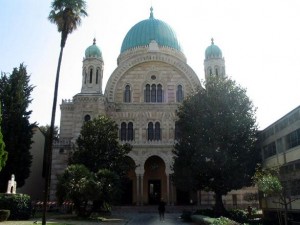FEATURES Florence, a Community of Arts and Culture
Aside from Florence’s well known artistic patrimony, one of the most interesting facts about this famed city is that it is home to about 950 Jews, the third largest Jewish community in Italy. The rich history of Florentine Jews is characterized by rapid change, struggle and resilience. The Jewish community of Florence is one of the oldest continuous Jewish communities in Europe, and also one of the most culturally important Jewish communities in all of Italy.
The story of Florentine Jews begins in the 14th century, when Jews from Portugal and Spain began emigrating to the Tuscan region. During this time, Jews were limited to working as moneylenders. Cosimo di Giovanni de’ Medici (better known as Cosimo the Elder), the de-facto ruler of Florence from 1434 to 1464, had an extensive mercantile background and realized that there was huge potential for Jewish moneylending and entrepreneurship in Florence. As a result, the Medici family recruited and encouraged Spanish and Portuguese Jews to settle in Florence, and the Jewish community was officially established in 1437.
This relationship that Cosimo the Elder started with his Jewish compatriots seemed as if it would be a mutually beneficial relationship; however, once his grand nephew, also named Cosimo de’ Medici, and known as Cosimo the First, became Grand Duke of Tuscany, the Medici policy toward the Jews changed. Cosimo I forced Jews to wear badges in 1567, closed the Tuscan border to non-resident Jews in 1569, shut down Jewish banks in 1570, and established a ghetto in 1571.
In a reversal to his father’s harsh attitude toward the Jews, Ferdinando I, the son of Cosimo I, opened Tuscany to Jews again, and openly invited Jewish merchants to settle in the Tuscan port city of Livorno. In order to encourage Jewish immigration to Tuscany, Ferdinando I granted Florentine Jews “free residence, unlimited access to trade and extensive self-government.”
Allowing Jews to settle in Livorno helped the Medici family and Florentine Jews to prosper. In fact, in 1632, the Jews of Livorno were the first to import coffee into Italy and the first to open coffee houses. And what would Italy be without espresso?
The perseverance and resilience that Florentine Jews have demonstrated is remarkable and is represented by the Tempio Maggiore, the Great Synagogue of Florence, which was completed in 1882 following the granting of equal rights to Jews in 1848. After the experiencing inconsistent treatment during the Medici reign and consistent discrimination from their Christian counterparts, Florentine Jews built this synagogue with its enormous bright green copper domes and intricate Moorish designs in order to show that Florence is just as much their home as it is their Christian neighbor’s. In general, Italian Jewish history is in great part characterized by marginalization and dominance by the Christian majority, and this is evidenced by the fact that most Italian synagogues are small and unassuming structures, while churches are often quite large and covered in intricate designs. The fact that the Great Synagogue of Florence competes with the Duomo of Florence not only in size but also in beauty is representative of Florentine Jewish resilience, perseverance and their will to show that Florence is their home.
In the summer of 2013, the Balagan Café, located in the palm-shaded garden of the synagogue, was launched. In Hebrew, “balagan” means “a chaotic mess” and the owner decided to name this café Balagan because he believed that Florentine Jews have suffered a history that can be considered a “mess”, however, regardless of their harsh history, they have stayed resilient and have managed to persevere through their hardships. The café was initially considered an experiment, so calling it “Balagan” was fitting because, it was “an acceptance of confusion that’s not easy to define,” according to Enrico Fink, artist, musician, and cultural affairs director of the Florence Jewish community.
Besides serving food and coffee (thank you, Livornese Jews), the purpose of this café is to introduce and expand Jewish culture in Florence by offering mini festivals and events almost every Thursday night from June to August. The café has hosted a variety of performers including rock singer Raiz, jazz clarinetist Gabriele Coen, and even architect Massimiliano Fuksas. In addition, there are food stands that sell kosher meals and wine, while also including occasional cooking lessons that can sometimes transform into competitions, between Sephardic and Ashkenazi cooking styles. The combination of the synagogue and the Balagan Café in a predominantly Christian environment illustrates the effort that Florentine Jews are making to not only educate their neighbors, but to also present aspects of Jewish culture that have previously been overlooked.
From a time in which Jews were limited to money lending, forced to live in ghettos, and even faced inhumane persecution during World War II, Florentine Jews have managed not only to persevere, but to thrive. The Balagan Café is a clear attempt, in the words of Enrico Fink, to “start building relations between the town, the synagogue and the Jewish community.”
*Nebiyat Tadesse is a student at Muhlenberg College (Allentown, Pennsylvania, USA)

